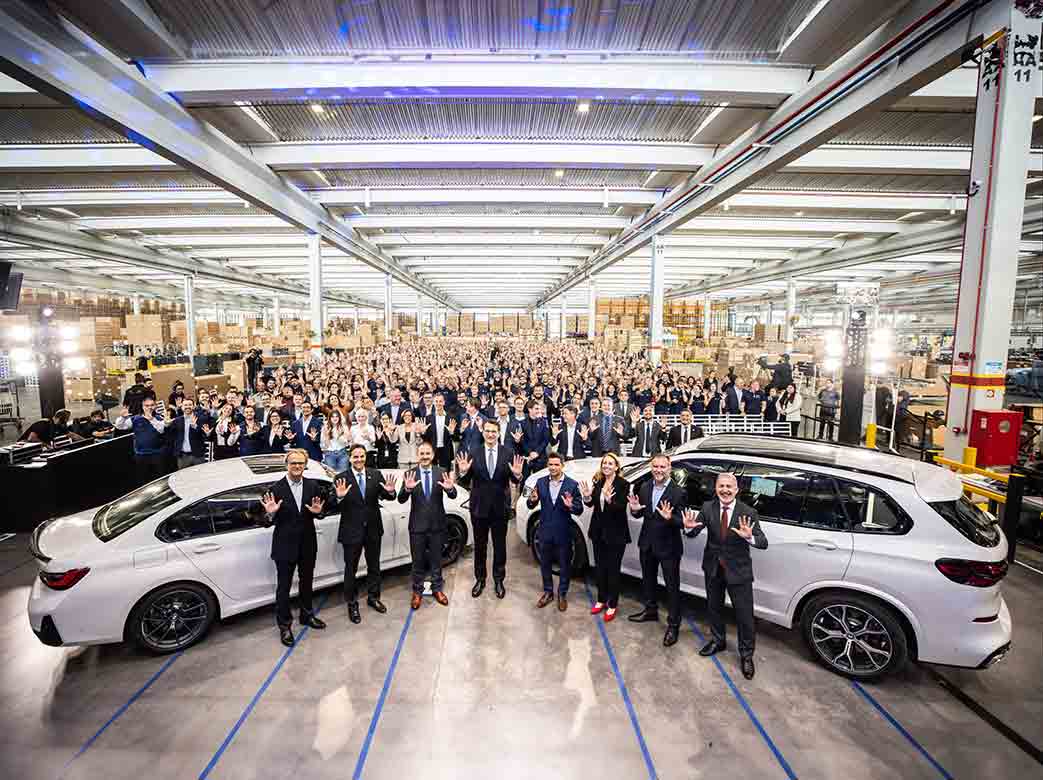2024 年 10 月 7 日
+++几十年来,宝马集团的本地生产一直是亚洲、北非和南美市场不可或缺的一部分 +++在同一生产线上生产十多种不同车型 +++宝马集团阿拉夸里工厂庆祝投产十周年,生产汽车超过10万辆 +++宝马集团继续在巴西投资建设生产基地 +++
圣保罗/慕尼黑。宝马集团位于巴西圣卡塔琳娜州的阿拉夸里工厂即将迎来成立 10 周年,目前已生产了 10 多万辆汽车。宝马集团的本地工厂是该公司在欧洲、美洲和中国完整工厂的完美补充,使宝马集团能够通过本地化生产开拓新市场。本地化生产是宝马集团的悠久传统,使市场能够以具有竞争力的价格提供各种本地制造的汽车。
宝马集团于 1957 年在英国开始生产 Isetta,目前已在亚洲、北非和南美洲设立了七个生产基地。这一方法背后的原则是生产跟随市场。宝马集团南非罗斯林工厂和中国沈阳工厂已从本地生产发展成为全规模工厂。
过去 10 年来,阿拉夸里工厂已完全融入生产网络,为巴西市场提供产品。除了拥有自己的冲压车间外,该工厂还覆盖了所有必要的生产领域,可以生产各种车型和传动系统。
巴西工厂遵循灵活生产原则,在一条生产线上生产多种车型。除了汽油和混合动力传动系统外,巴西还生产灵活燃料车型。
在阿拉夸里生产的宝马 3 系和宝马 X1 车型是巴西同类车型中最畅销的车型,确保了该品牌在 2023 年连续第六年在高端车型领域的领先地位。该工厂目前还生产宝马 X3 和宝马 X4,宝马 X5 PHEV 将在几周后加入生产,从而成为生产网络中下一个生产电动汽车的工厂。
宝马集团在巴西的支出取得了成果。
生产网络中的本地工厂贡献远不止生产汽车,巴西就是一个典型的例子:自 2014 年以来,宝马集团已在该工厂投资超过 18 亿雷亚尔,专注于生产以及研发设施。2025 年至 2028 年期间,宝马集团将在该国再投资 11 亿雷亚尔。“巴西为其他新车型的本地生产和新技术的开发提供了潜力。”宝马集团董事会负责生产的董事 Milan Nedeljković 表示。“我们在全球销售的每一辆 BMW 和 MINI 都已经融入了巴西的研发成果——我们打算在此基础上再接再厉。”
因此,宝马集团本地生产的成功故事仍在继续——无论是在巴西还是在世界各地。
高度灵活性是成功的关键。
全球各地的本地工厂可在同一生产线上生产十几种车型。有限的垂直整合程度使工厂具有较高的灵活性。
这是通过采用简单而富有创意的解决方案、保持低水平的自动化和实施个性化节拍时间来实现的,同时不会影响质量。所有车辆都符合与全厂生产的车辆相同的交付标准。
“宝马集团的本地生产至关重要,这不仅有助于帮助具有增长潜力的新兴市场站稳脚跟,也是我们业务的盈利组成部分。凭借创新的装配解决方案,从轿车到 SAV,中档到豪华级车辆都可以在一条生产线上生产,”宝马集团生产网络和物流负责人 Michael Nikolaides 说道。
宝马集团在巴西、印度和泰国拥有自己的工厂。它还与印度尼西亚、马来西亚、越南和埃及的当地生产合作伙伴合作。2023 年,宝马集团在当地工厂生产了约 50,000 辆汽车(不包括宝马摩托车),几乎完全依赖当地员工和管理人员。
这些数字的实现得益于与整个工厂的密切合作——例如在生产规划、技术集成和零部件制造等领域。六家包装公司负责准备运输零部件:三家位于德国,中国、墨西哥和美国各一家。在这些工厂,相关零部件根据模块化原理配置成组装套件,然后分发到当地工厂。
BMW Group taps into markets with local production: 10 years of BMW Group Plant Araquari showcases high flexibility
07.10.2024
+++ BMW Group’s local production has been essential to markets in Asia, North Africa and South America for decades +++ More than a dozen different models produced on same line +++ BMW Group Plant Araquari celebrates 10 years of production, with over 100,000 vehicles built +++ BMW Group continues its expenditure in Brazil as production location +++
São Paulo/Munich. BMW Group Plant Araquari in Santa Catarina, Brazil, is celebrating its 10th anniversary, having produced more than 100,000 vehicles. BMW Group’s local plants serving as the perfect complement to the company’s full plants in Europe, the Americas and China and allowing the BMW Group to tap into new markets through localised production. Local prodution has a long tradition at the BMW Group, enabling markets to offer a wide range of regionally manufactured vehicles at competitive prices.
What began in 1957 with production of the BMW Isetta in the UK, now comprises seven locations across Asia, North Africa and South America. The principle behind this approach is that production follows the market. The BMW Group Plants Rosslyn in South Africa and Shenyang in China have thus developed from local production into full-scale plants.
For the past 10 years, the site in Araquari has been fully integrated into the production network, supplying the Brazilian market. By covering all essential areas of production, except for having its own press shop, the plant can manufacture a wide range of vehicle models and drive train variants.
The plant in Brazil follows the principle of flexible production and manufactures various models on one production line. In addition to petrol and hybrid drive trains, flex-fuel models are also built in Brazil.
The BMW 3 Series and BMW X1 models produced in Araquari are the top-selling vehicles in their segments in Brazil, securing the brand’s leading position in the premium segment for the sixth consecutive year in 2023. The plant currently also builds the BMW X3 and BMW X4, with the BMW X5 PHEV set to join them in a few weeks – thus becoming the next plant in the production network to manufacture electrified vehicles.
BMW Group expenditure in Brazil bears fruit.
The local sites in the prodiction network contribute significantly more than just manufacturing vehicles, with Brazil serving as a prime example of this: Since 2014, the BMW Group has expended more than BRL 1.8 billion in the location, focusing on production, as well as on research and development facilities. Between 2025 and 2028, the BMW Group will expend a further BRL 1.1 billion in the country. “Brazil offers potential for local production of other new models and for development of new technologies,” says Milan Nedeljković, member of the Board of Management of BMW AG responsible for Production. “Every BMW and MINI we sell worldwide already incorporates developments from Brazil – and we intend to build on this success.”
Thus, the success story of BMW Group’s local production continues – both in Brazil and around the world.
High flexibility as key to success.
More than a dozen models can be manufactured on the same line at the local plants worldwide. The sites’ high level of flexibility is facilitated by their limited degree of vertical integration.
This is made possible by employing simple, creative solutions, maintaining a low level of automation and implementing individual takt times – without compromising quality. All vehicles meet the same delivery standards as those produced at full plants.
“BMW Group’s local production is essential, not only for helping emerging markets with growth potential to establish themselves, but also as a profitable component of our business. With innovative assembly solutions, mid-range to luxury class vehicles, from sedans to SAVs, can be produced on a single line,” says Michael Nikolaides, responsible for the production network and logistics at the BMW Group.
The BMW Group operates its own plants in Brazil, India and Thailand. It also collaborates with local production partners at sites in Indonesia, Malaysia, Vietnam and Egypt. In 2023, the BMW Group manufactured around 50,000 vehicles (excluding BMW Motorrad) at its local plants, relying almost exclusively on local employees and managers.
Such numbers are achievable thanks to close collaboration with the full plants – for example, in areas like production planning, technical integration and component manufacturing. Parts are prepared for shipping by six packing companies: three located in Germany, and one each in China, Mexico and the US. At these facilities, the relevant components are configured into assembly kits based on the modular principle and then distributed to the local plants.

